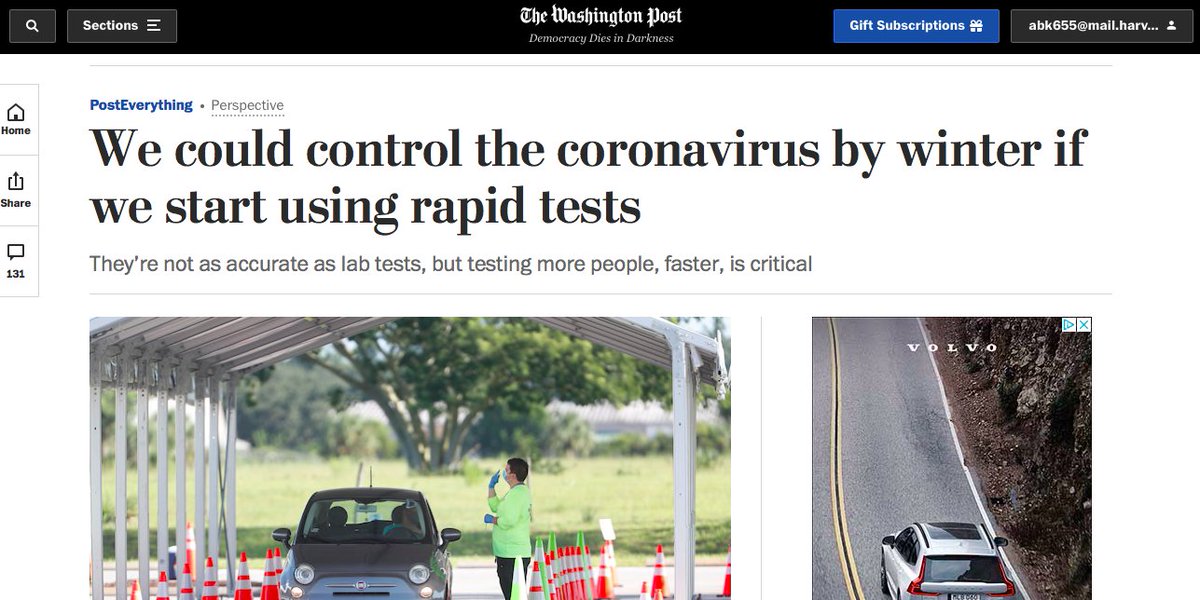1/ Sharing our new piece in @washingtonpost on using rapid tests for epidemic control.
It shouldn't have taken 8 months for the idea to pick up- the same arguments were made for Ebola, Zika & other epidemic prone diseases by @RanuDhillon @sri_srikrishna
https://www.washingtonpost.com/outlook/2020/08/17/rapid-coronavirus-testing-pcr/
It shouldn't have taken 8 months for the idea to pick up- the same arguments were made for Ebola, Zika & other epidemic prone diseases by @RanuDhillon @sri_srikrishna
https://www.washingtonpost.com/outlook/2020/08/17/rapid-coronavirus-testing-pcr/
2/ The key is reducing the period of time between when someone is infected and when they are diagnosed+isolated.
We don't need a test that tells us that perfectly as much as we need a test that tells us that *quickly*, even if it wrong some of the time.
We don't need a test that tells us that perfectly as much as we need a test that tells us that *quickly*, even if it wrong some of the time.
3/ This matters for breaking transmission chains.
Even if the test sometimes gives you a false negative result, we are weighing this against not being tested at all or extremely slow results.
Without diagnosis, every missed case is functionally a "false negative" anyways.
Even if the test sometimes gives you a false negative result, we are weighing this against not being tested at all or extremely slow results.
Without diagnosis, every missed case is functionally a "false negative" anyways.
3.5/ And, if used daily, rapid tests will still be exceptionally good *when you are most infectious*, which is the key here.
@michaelmina_lab & colleagues have a great website which explains these concepts clearly/ways to advocate as well --> https://www.rapidtests.org
@michaelmina_lab & colleagues have a great website which explains these concepts clearly/ways to advocate as well --> https://www.rapidtests.org
4/ In the piece, we also talk about false positives.
These can be problematic for a couple of reasons-- people may think they had been infected, & follow the CDC 3 month "clearance" period where they don't quarantine + it can also strain the contact tracing system.
These can be problematic for a couple of reasons-- people may think they had been infected, & follow the CDC 3 month "clearance" period where they don't quarantine + it can also strain the contact tracing system.
5/ Overall, less about diagnosing everyone perfectly- more about making sure that people who may be sick are not out in the community infecting others.
My colleagues @RanuDhillon @sri_srikrishna et al modeled this out previously for Ebola (see below) https://www.thelancet.com/journals/laninf/article/PIIS1473-3099(14)71035-7/fulltext
My colleagues @RanuDhillon @sri_srikrishna et al modeled this out previously for Ebola (see below) https://www.thelancet.com/journals/laninf/article/PIIS1473-3099(14)71035-7/fulltext
6/ @j_g_allen had a great video explanation here which is definitely worth your while.
Many of us are proponents of the rapid testing strategy-- we need all forces pushing for this so that we can feasibly bring transmission under control quickly. https://twitter.com/j_g_allen/status/1294600163244347392?s=20
Many of us are proponents of the rapid testing strategy-- we need all forces pushing for this so that we can feasibly bring transmission under control quickly. https://twitter.com/j_g_allen/status/1294600163244347392?s=20
7/ @PaulSaxMD has written about this a number of times as well (see blog below) & has been tirelessly tweeting/advocating for this approach. It will be an all-hands on deck effort but this can be a game-changing diagnostic strategy for epidemic control. https://blogs.jwatch.org/hiv-id-observations/index.php/rapid-inexpensive-home-testing-for-covid-19-may-get-us-out-of-this-mess-before-a-vaccine/2020/07/05/
cc @apoorva_nyc @B_resnick @CarolineYLChen @kakape @amymaxmen @zeynep @lisalsong @acsifferlin @BhadeliaMD @syramadad @SaskiaPopescu @JuliaLMarcus @IngridKatzMD @ReganHMarsh @PoliticsReid @Edpilkington @drdavidwalton @edyong209 @alexismadrigal @EpiEllie @powellnyt

 Read on Twitter
Read on Twitter


